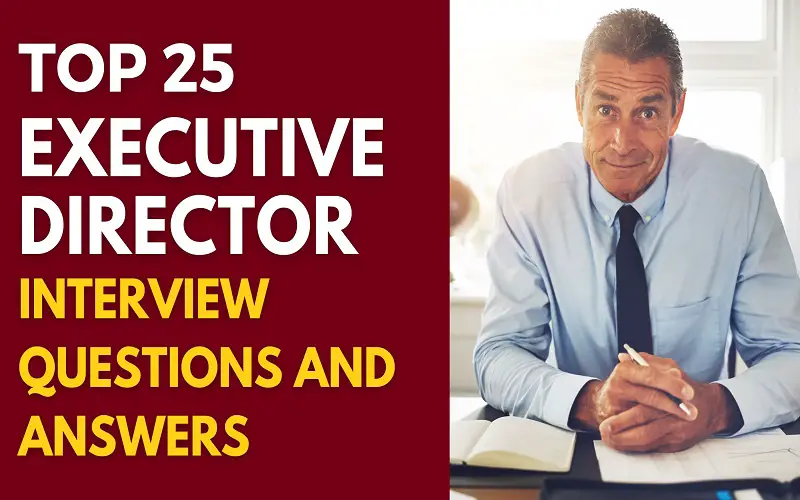A director is a crucial team member regardless of the business size. Directors oversee the company’s strategic vision and monitor all activities to ensure they are per it. One must complete a director job interview before one can be recruited as a director. Unlike previous job interviews you have had in the past, this one will be unique. The emphasis of the director job interview will be more on your background and potential contributions to the business. We have included some potential interview questions and your potential responses to help you be ready. Read on these 25 common interview questions and answers to prepare you for your next executive director interview.
1. Tell Me About Yourself And Why You Want To Be A Managing Director.
I am a passionate, devoted, and fully dedicated managing director with extensive management, leadership, financial, and business-growth expertise. I extensively studied your company, the market you serve, and the position you hold before applying to become your managing director to ensure I could offer substantial value to the company. Being a managing director entails a great deal of duty. Therefore, you must be prepared to accept complete accountability and responsibility for everything inside the firm you are in charge of. As your managing director, I believe I possess the abilities, principles, morals, and attributes necessary to succeed. Simply put, I want to be a managing director since it is the only position that I believe closely matches my expertise and strategic skills.
2. Why Do You Wish To Be A Part Of Our Company?
As I said in my earlier response, I did extensive research on your company and the sector you are in. You offer top-notch goods and services, a dedicated team, and solid business and financial objectives to help me realize my aims. Although becoming a managing director is an honor, I firmly believe that someone should only seek the position if they are sure they can lead the business to continuous progress, expansion, and financial success. Your present situation is robust, which tells me that years of solid foundation building have already been done. With the help of solid management, a clear organizational vision, and inspiring leadership, I’ll be able to take you to the next level.
3. What Is Your Knowledge About Our Business And Our Sector?
Because I adore technology, I’ve been following this firm ever since I was in college. I’m thrilled to be having an interview with such a progressive organization. I believe you are working on a new piece of software that will assist organize corporate processes. It amazes me that your business is always searching for methods to increase productivity.
4. How Do You Deal With Tension In Your Lineup?
I try to deal with team tension as soon as I detect it. For example, a few years back, I worked in a group on a project where we had to complete a sizable design for a customer. Although the bulk of the crew got along well, one person kept missing deadlines. The group members argued as a result of this.
I pulled the employee aside to talk about the matter rather than allowing it to fester. He admitted that his problems were interfering with his ability to do his job. We devised a solution that allowed him to rearrange his hours and schedule to handle this problem. He was able to catch up with the gang as a consequence.
5. How Do You Approach Management?
The cornerstones of my management philosophy are communication, openness, and trust. I make a conscious effort to avoid micromanaging while remaining informed, offer clear instructions, and describe our general objectives at the beginning of every project.
For instance, a few years ago, I worked on a large software project where five different programmers were each responsible for writing a different section of the final program’s code. I created a message board that enabled instant messaging and included a space for status updates so that members could keep the group informed. It offered us all a means to collaborate. It enabled me to keep informed about every facet of the project without being invasive.
I also think it’s essential to be a manager that is accessible to my staff and available to them in times of need. Additionally, I like assigning work to my team members depending on their skills. For instance, I’ll offer someone additional chances to speak in front of groups if they perform well at it. This enhances our workplace atmosphere and makes everyone feel appreciated.
6. How Do You Resolve Disputes Among Team Members?
Every story has two sides, so I believe it’s crucial to be as impartial and unbiased as possible. A few years back, I saw two team members who were obviously at odds with one another. I sat down with them one by one and asked them to explain what was happening rather than ignoring it in the hopes that they would figure it out on their own. The issue was handled when we discussed professional, acceptable options that benefited both sides.
7. What Are Your Leadership Strengths?
My high level of organization enables me to manage tasks while keeping track of every little detail. I also have good communication skills, enabling me to cooperate with workers on suggestions for improvement while clearly outlining my expectations. I also excel at finding innovative solutions to challenges. Suppose there is a disagreement among team members. In that case, I can utilize my problem-solving abilities to find compromises that satisfy everyone.
8. What Makes You Desire To Work In Management?
One of the main factors influencing my desire to go into management is my accomplishments as a project leader. In a previous position, I had the chance to lead teams of at least five people on several high-profile projects. While I enjoyed the chance to use my abilities, teaching others to succeed was the most satisfying and, ultimately, an area where I excelled. I believe that I have been an individual contributor before, which gives me an edge since I am aware of the team’s viewpoint. A managerial position would allow me to continue using my active listening, delegating, and communication abilities to remove roadblocks and settle disputes.
9. What Does Success Mean To You?
Setting objectives is a great way to gauge progress, in my opinion. By articulating the procedures needed to accomplish goals, I can easily keep track of my progress, outcomes, and overall success.
We were tasked with assembling a technical documentation collection with an earlier team. We divided it into doable micro-goals by going aisle by aisle and even shelf by shelf. I then added rewards for finishing chapters to keep us motivated. We not only met the deadline but also kept each other motivated by including enjoyable aspects in the project, which is a massive accomplishment in and of itself.
10. What Long-Term Professional Ambitions Do You Have?
Before advancing to the C-suite, I want to serve as a director for an additional five years. After that, I’d want to become CEO.
11. Describe The Method You Use To Plan And Complete Tasks.
Project planning and completion procedures vary somewhat. In that, I manage my workload in a variety of ways.
I first set up my process using project management tools. I begin by setting up a brand-new project with all the required facts, such as customer information, financial details, and other pertinent data. Then, I generate a different task list for each project component, such as research, design, and development. I divide up these responsibilities among my team members following their availability and according to their areas of strength. Finally, I frequently convene with my team to review our progress and make any necessary modifications.
As an alternative, I rank the tasks I have to do and calculate how long each will take. I then start working and set the timer. By putting a timer to work, I can avoid getting sidetracked and finish the job faster. Finding a method that works for me took some effort, but so far, it has been of great assistance to me. I do, however, constantly make adjustments as needed.
12. Describe A Moment When You Had To Settle A Dispute.
Two coworkers at my previous job often argued with one another. They would quarrel over minor issues, impairing their productivity at work. I had separate meetings with the two workers to find out what was going on. One discovered that while they weren’t experiencing issues at work, they were. I assisted them in developing solutions so they could concentrate on their work while also getting their problems under control.
13. What Qualifications Or Certificates Do You Have In This Area?
I’m now working on getting my executive director certification. Additionally, I have a bachelor’s in business administration with a focus on marketing. I also have five years of experience as a marketing director in the workplace.
14. What Were The Primary Duties In Your Previous Position?
In my previous role as an assistant director, I was in charge of budget management, recruiting new employees, and production management. This included planning the shooting schedule, recruiting the crew, and ensuring we had everything we needed to finish each job on time. Additionally, it required fostering constant communication among team members so that everyone was aware of their responsibilities and could collaborate successfully.
15. How Would Your Former Teams Characterize You?
People on my past teams have said I’m always eager to hear what they say. I’m renowned for being a compassionate leader who cares about my team’s success. My staff members can easily approach me with any queries or worries they may have.
16. Describe A Typical Day At Your Previous Job.
Checking my emails first thing in the morning helps me make sure I reply to any important messages or requests from coworkers. I then follow up with my team members to find out how they are doing and provide assistance as required. I then meet with my boss to go over our daily objectives and ensure we are on course to reach them. I meet with other directors daily to work on projects and ensure everyone has what they need.
17. What Strategies Do You Use To Monitor The Progress Of Teams And Projects?
I designate due dates to each work and manage all of my projects using a project management program. Me, I also make weekly objectives so that I can keep organized. I often meet with my team members to review their progress and, if necessary, to provide guidance or ideas. This provides me the chance to learn more about their difficulties and assist them in overcoming those obstacles.
18. How Do You Assist And Motivate Team Members To Be Successful?
I think a director’s job is to help my team members achieve their career objectives. I make it a point to have one-on-one coaching sessions with every staff member since I have always been enthusiastic about assisting people in their success. We discuss how they might increase their performance at work during these discussions. I also do regular training sessions to advise on enhancing efficiency and production.
In addition, I think that part of my job as a leader is to uplift and encourage the people on my team. I try to be accessible to anybody who requests help or criticism on their work. Additionally, I regularly visit each department to review our progress, difficulties, and possibilities. I can learn more about each team member and determine where they need assistance.
19. What Methods Do You Use To Evaluate The Team’s Work?
Regular check-ins with my team help me keep informed about what they’re working on and if they need any support, in my experience. Additionally, I like having one-on-one meetings with each team member at least once every three months to learn more about them and their objectives. These two techniques have made it easier for me to see problems before they get out of hand.
20. What Aspects Of Agreements And Contracts Do You Take Into Account?
I consider every element of the contract or agreement, such as who is responsible for what, completion dates, and any dangers that could be associated with the undertaking. Additionally, I ensure that the contract or agreement has language that spells out what will happen if either side doesn’t follow through on their duties. Finally, I make sure that before signing a contract or agreement, legal counsel has examined it.
21. Describe The Steps You Take To Hire New Workers.
I begin by creating a list of every job that needs to be filled. I then review our application database to discover folks who meet the requirements. I arrange telephone interviews with each candidate and include other team members. After the applicant has met with everyone, I reexamine their résumé and decide whether or not to extend an offer of employment.
22. As A Director, How Do You Set And Accomplish Goals?
I choose my objectives by determining what I want to do in a certain amount of time. Then, I divide each goal into more manageable activities that assist me in achieving the bigger goal. For instance, while XYZ Company employed me, I aimed to boost sales by 10% over the next three months. To accomplish this, I divided the effort into manageable chunks, including reaching out to new customers, enhancing customer service, and boosting our web presence. Each action furthered our ultimate objective of raising sales.
23. Describe A Complex Project You Oversaw And How You Dealt With Obstacles Along The Road.
In my former position as an event planner, I had the responsibility of organizing a significant corporate event with plenty of moving components. The customer requested a distinctive concept for the event. Therefore, I had to locate many suppliers that could provide the necessary services. I had to employ another firm to assist me since the vendor I first recruited lacked enough personnel to satisfy our requirements. As a result, the timeframe was somewhat delayed. Still, I carefully collaborated with both businesses to ensure the event day ran without a hitch.
24. Describe Your Experience Modifying A Brand’s Image Via Public Relations.
After speaking with prospective consumers, I noted their reasons for using our competitors’ goods and the qualities they seek when deciding which product to buy. I then went back to my team to develop a marketing plan incorporating these ideas and ease their concerns.
25. Did You Ever Encounter A Problem That You Couldn’t Fix In Your Previous Position?
There have been several instances of this kind. I made numerous futile efforts to resolve the matter before I asked my more seasoned coworkers for guidance. When it failed, we decided to change course and look for another solution. We assessed the issue and decided that additional investigation was not practical when that did not work.
Conclusion
The most acceptable position you can obtain in terms of pay and professional reputation is executive director. However, great responsibility comes with great power. Therefore, you will have to compromise your position.
Because this isn’t a standard job, it’s not always simple to forecast what will happen during your interview. There is one thing that is certain: you will discuss your previous job experience in leadership and management positions, and you will be required to give a compelling vision for the organization’s future. Additionally, as I said before, you can encounter some challenging behavioral questions. Even though it is distinct in specific ways, the interview for the ED post has one trait with all other job interviews: preparation pays off. Your chances of succeeding in this challenging interview will increase the more time you invest in preparation. I wish you success!




